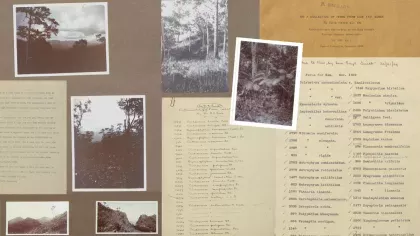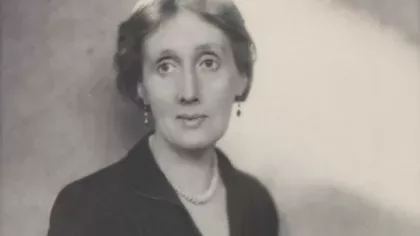16 December 2016
A plant-hunter's Christmas
Francesca Mackenzie looks at stories from the archives about 'Christmases long, long ago', and discovers some surprising similarities with the festive season today.

Christmas abroad?
Going away for Christmas these days is often a preferable option to staying in the UK, filled with miserable weather, family bickering and stress. Maybe the turkey wasn’t cooked in quite the same way that Great Aunt Maud used to or the younger family members are too busy putting their presents on eBay to pay attention to the game of charades.
What about Christmas 100 or 150 years ago? Interestingly, there are quite a few documents in the archives detailing similar issues around the period that we experience today. For example, there is a letter from Miss E. Maude Warren in British Columbia expressing relief that her specimens were sent to Kew on time. They were dispatched at the same time as the plum puddings and Christmas gifts, her expressions of relief are reminiscent of the rush to catch the Royal Mail pre-Christmas deadline. We also see the inevitable problems of public transport in a letter sent to Kew from Skinner, bad weather has detained his ship, there will now be no time to stop and he must travel at once to be in Scotland before Christmas.
The importance of weather
One thing stood out above all and this was a propensity to talk about the weather. In his Antarctic Journal Joseph Hooker writes “to a gloomy Christmas too like an English one in weather without its more than counter-balancing comforts”. Hooker was on the voyage for three Christmases and the entries become steadily gloomier until the last one which neglects to mention that it is Christmas at all. There are few other details in his Christmas entries apart from weather related comments.
Sir Hugh Low has a more positive attitude, though again his comments are chiefly about the weather - “Christmas day has stolen upon me unawares… At home we look for it a month before it comes and the cold weather gives notice of its approach. Here, however, the weather is delightful such as our warmest summer days… I hope we shall have a continuance of such fine weather.” While Nigel Hepper begins his entry with “A hot harmattan day with no snow visible anywhere”.
When two Englishmen meet the first thing they talk about is the weather.
Christmas festivities
Christmas was celebrated in a variety of ways. Price chose to go to an opening of a school while Hepper went to a Dutch Lutheran service. Nigel Hepper describes in vivid detail listening to the General Overseas BBC and the dress of the locals at the church; “brilliant cottons and gay head ties”. He stays at a local Dutch family’s home which is Scandinavian in style and is treated to Dutch Christmas cake and other delicacies such as marrow jam and pickled pumpkin. “I imagined the folk at home huddled round a fire cracking nuts and eating stuffed dates. There was I in shorts and shirt… gazing… towards the frontier with the French Cameroons… lost in the harmattan haze.”
Darwin writes a vivid account of Christmas on the Beagle in 1833. “After dining in the Gun-room, the officers and almost every man in the ship went on shore. The Captain distributed prizes to the best runners, leapers, wrestlers. These Olympic games were very amusing… Certainly a much better way of passing Christmas day than the usual one, of every seaman getting as drunk as he possibly can.”
Sprague and the issues of local transport
Sprague on his expedition to Columbia starts by describing the festive season in the city - “we were regularly woken up at 4:30 a.m. by the joyous clang of the church bells and the noise of exploding crackers”. This is, however, short-lived as he recounts attempting to find a boat to take them down the river. Intending to leave on the 23rd the date slowly becomes delayed until they finally set off on Christmas morning. Unfortunately for him the journey proves far more hazardous than predicted for “No sooner had we put off from the shore than the piragus started leaking rapidly and had to be brought to land for repairs… However, the hole in the boat’s bottom was eventually stopped up and… we poled a few miles up-stream before stopping for the night”. Sprague describes the polling as “very laborious and tedious as we had on board about 2 tons of luggage” way up the river but worse was Boxing Day where the boatmen will not fix the hole in the boat’s roof despite the rain. They “invented all the excuses they could think of in order to escape the extra work”.
Christmas abroad is not without its own particular trials and tribulations that even the plant-hunters could not escape.
- Francesca Mackenzie -
Archives Graduate Trainee


